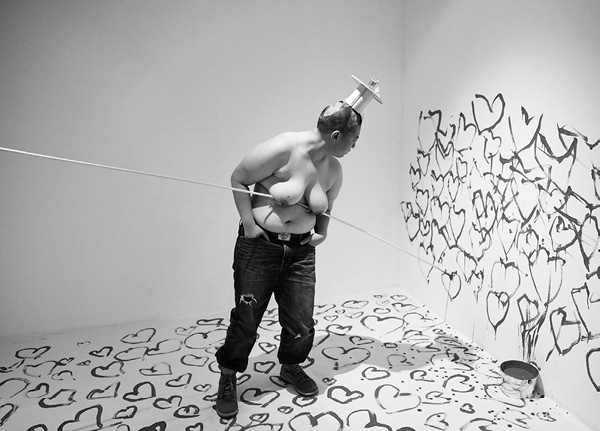
DRAWING HEARTS ON MY DINNER TABLE
first performed on October 28, 2016
SAIC Sullivan Galleries, Chicago, IL
performed once in 2016
ZHIYUAN YANG
Chicago, IL
802181170z802181170y802181170a802181170n802181170g8021811705802181170@802181170s802181170a802181170i802181170c802181170.802181170e802181170d802181170u
zhiyuanyang.com
DRAWING HEARTS ON MY DINNER TABLE
ZHIYUAN YANG
I belonged to no club and was a member of nothing in the world.
I was ashamed of public responses to my gender ambiguity.
I do not have to wear my masculinity as a stigma.
I convert my masculinity to a sense of pride and indeed power.
I have a sense of humor about my discomfort in the world.
I am going to show you my boobs.
I performed “Drawing Hearts On My Dinner Table” for one hour. I was half naked, wearing blue jeans, a Transformer belt, and a pair of Timberland boots. At the same time, I stuck a decorated Barbie table on my head, and a long stick under my breast. On both sides of the stick were two brushes: an oil painting brush and a traditional Chinese one. I played Teresa Teng’s love songs as background music and used the brushes to draw heart shapes on the wall.
Teresa Teng is my parents’ favorite singer, and they listened to her music secretly during the Cultural Revolution. Those years, anything involving romantic notions was prohibited. My parents admired this woman’s courage, who expressed her love in public so bravely. Then, Teng became their hero in his own life.
Heroic masculinity has been produced by both male and female bodies.
I am a woman in drag. Drag entails the performance of a gender that is supposedly opposite to one’s ‘true’ gender. It pushes one to question the extent to which certain traits that are considered masculine or feminine are true, essential, and indivisible from the self. Rather than viewing drag as an imitation, I view it as an action that defines the parameters, boundaries, and practices that create the notion of gender in the first place.
I am an aggressive femme. I am not going to say that the masculinity I perform is not a part of me, but I also have a feminine side. Gender is not ontological; rather it comes to existence through actions: gender proves to be performative. I do not believe that we are moving steadily toward a genderless society, or even that this is a utopia to be desired, but I do believe that a major step toward gender parity, and one that has been grossly overlooked, is the cultivation of female masculinity. In my world, no system of classification can successfully catalogue or explain the infinite vagaries of human diversity.